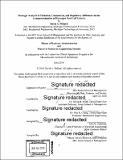Strategic analysis of technical, commercial, and regulatory influences on the commercialization of hydrogen fuel cell vehicles
Author(s)
Millard, David A. (David Anthony)
DownloadFull printable version (5.227Mb)
Other Contributors
Leaders for Global Operations Program.
Advisor
David R. Keith and Wai K. Cheng.
Terms of use
Metadata
Show full item recordAbstract
Increasing regulatory pressures are being applied to automotive manufacturers requiring them to reduce the negative impacts that their vehicles have on the environment. In response to these regulations, and evolving consumer preferences, manufacturers are heavily invested in identifying technologies to increase fuel economy and reduce greenhouse gas emissions. Alternative propulsion technologies, such as fuel cells, are of tremendous interest to provide these benefits. However, factors including refueling infrastructure requirements, technology costs, and consumer willingness-to-consider all significantly impact the commercial viability of hydrogen fuel cell vehicles (HFCVs). I develop a system dynamics model to explore the temporal importance of critical factors required to build a market for HFCVs that is sustainable in the long-term. This methodology allows for the following: 1) Infrastructure: Identification of optimal hydrogen infrastructure growth necessary in order to support HFCV adoption and minimize required fueling stations. Additionally, the conditions in which external construction and operational support may give way to organic growth can be determined. 2) HFCV Ownership Costs: A time-dependent characterization of vehicle price and ownership subsidies can be ascertained to facilitate adoption. 3) Familiarity Accumulation: Assessment of the marketing investment necessary to yield desired HFCV adoption while minimizing costs. 4) Regulatory Requirements: Projection of compliance with Zero Emission Vehicle (ZEV) Action Plan requirements, highlighting potential impacts and possible mitigation measures.
Description
Thesis: M.B.A., Massachusetts Institute of Technology, Sloan School of Management, 2016. In conjunction with the Leaders for Global Operations Program at MIT. Thesis: S.M. in Engineering Systems, Massachusetts Institute of Technology, School of Engineering, Institute for Data, Systems, and Society, 2016. In conjunction with the Leaders for Global Operations Program at MIT. Cataloged from PDF version of thesis. Includes bibliographical references (pages 46-47).
Date issued
2016Department
Leaders for Global Operations Program at MIT; Massachusetts Institute of Technology. Engineering Systems Division; Massachusetts Institute of Technology. Institute for Data, Systems, and Society; Sloan School of ManagementPublisher
Massachusetts Institute of Technology
Keywords
Sloan School of Management., Institute for Data, Systems, and Society., Engineering Systems Division., Leaders for Global Operations Program.